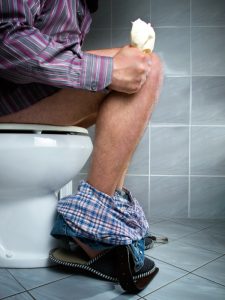Anal fissures are small skin tears in the lining of the anus, and they can occur when passing hard or large stools. Anal fissures usually cause pain and bleeding with subsequent bowel movements. Although they most often affect teens and adults, anal fissures are actually the most common cause of infantile rectal bleeding.
Though most anal fissures will heal within a few weeks with constipation treatment, some anal fissures can become chronic. When a chronic anal fissure doesn’t heal, medical treatment or surgery can usually relieve discomfort. If you find yourself in this situation, contact us at 855.360.9119 to schedule an appointment with one of our Beverly Hills colorectal surgeons.
SYMPTOMS, CAUSES, AND RISK FACTORS
 You should make an appointment to see your doctor, or our colorectal surgeons, if you experience painful bowel movements and/or see blood on your stools or toilet paper after bowel movements. Other signs and symptoms of an anal fissure include:
You should make an appointment to see your doctor, or our colorectal surgeons, if you experience painful bowel movements and/or see blood on your stools or toilet paper after bowel movements. Other signs and symptoms of an anal fissure include:
- Painful bowel movements (sometimes can be severe)
- Pain after bowel movements for up to several hours
- Bright red blood on stools or toilet paper
- Itching or irritation around the anus
- Visible cracked skin around the anus
- A small lump or skin tag on the skin near the anal fissure
The most common causes of anal fissures include:
- Large or hard stools passing through the anal canal
- Constipation and straining during bowel movements
- Chronic diarrhea
- Inflammation of the anorectal area due inflammatory bowel disease (IBD)
Other less common causes of anal fissures include anal sex, cancer, HIV, tuberculosis, and syphilis. Infants and older adults are also likely to suffer from an anal fissure. Pregnant women and people with Crohn’ disease are also high risk factors for developing this condition.
DIAGNOSING ANAL FISSURES
After explaining your symptoms, your doctor will next ask for your medical history and then perform a physical exam. This will include an inspection of your anal region. If the tear is visible, then it’ a simple anal fissure diagnosis.
If the examination, which involves inserting a gloved finger into your anal canal, is too painful, your doctor might not perform a rectal exam. In some cases, a short, lighted tube (known as an anoscope) can be used to inspect the anal canal to determine the cause of anal pain if the external exam is inconclusive.
If your signs and symptoms suggest you might have an underlying disorder such as Crohn’s disease or colorectal cancer, your doctor may recommend further testing with a flexible sigmoidoscopy, colonoscopy, or pelvic MRI.
If you are diagnosed with an anal fissure, your family doctor or general practitioner will likely refer you to a colorectal surgeon.
TREATMENT OF ANAL FISSURES
Often, anal fissures heal on their own within a few weeks if patients keep stools soft by treating constipation. However, if the tear cannot heal within a few weeks, medical treatment is necessary.
Patients can make changes to their lifestyle to aid in both the recovery of an anal fissure as well as prevent future occurrences of anal fissures. These lifestyle changes include:
- Regular exercise
- Drinking adequate fluids each day
- Making sure fiber is a part of your diet
- Don’t strain during bowel movements
If lifestyle changes are not effective enough to treat the anal fissure, the following nonsurgical treatments might be recommended:
- Fiber supplements
- Sitz baths
- Medicated creams
- Nitrogylcerin
- Botox
- Calcium channel blockers
If your anal fissure hasn’t healed through more conservative treatments, you might be a candidate for a surgical procedure known as an anal fissurectomy with a possible partial sphincterotomy. This surgery reduces spasm and pain and promotes healing by cutting a small portion of the anal sphincter muscle. This anal fissure surgery is done on an outpatient basis at La Peer, which means that patients can go home the same day.
Other surgical treatments for fissures include:
CONTACT LA PEER’ DEPARTMENT OF COLORECTAL SURGERY
The Department of General & Colorectal Surgery at La Peer Health Systems specializes in treating problems of the abdominal area as well as the digestive organs. If you or someone you know has been diagnosed with anal fissures, please email us or call La Peer at 855.360.9119 to schedule an appointment with a Los Angeles colorectal surgeon.
Our colorectal surgeons are here to help. For more detailed information on fissure treatment, visit our Anal Fissure & Fistula Surgery Center of Excellence website.
Next, read about Colorectal Cancer Surgery.
